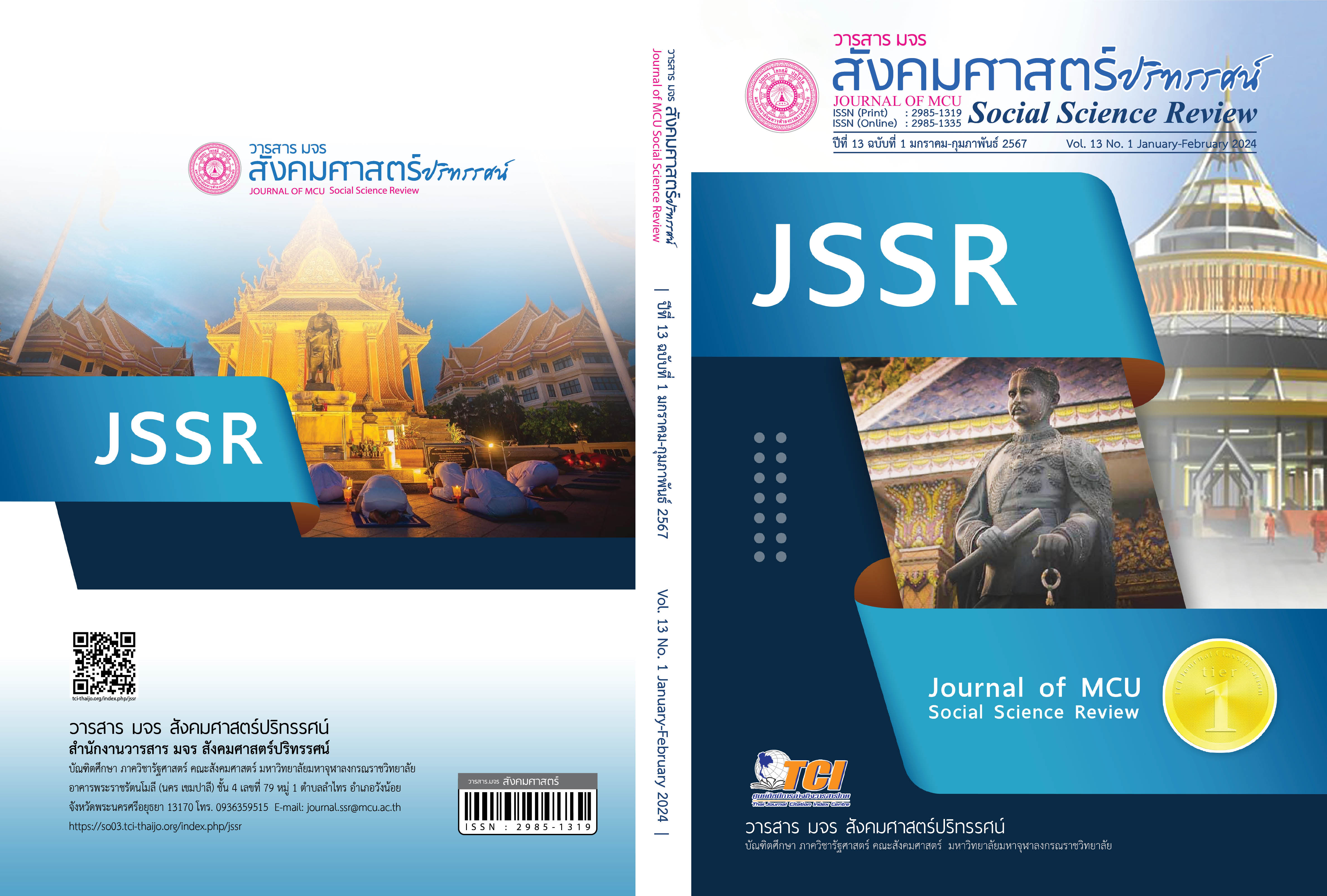ระดับการรับรู้วัฒนธรรมองค์การเชิงพุทธในศูนย์การแพทย์กาญจนาภิเษก
คำสำคัญ:
การรับรู้, วัฒนธรรมองค์การเชิงพุทธ, ศูนย์การแพทย์กาญจนาภิเษกบทคัดย่อ
บทความวิจัยนี้มีวัตถุประสงค์ 1. ทราบระดับการรับรู้วัฒนธรรมองค์การเชิงพุทธของบุคลากรศูนย์การแพทย์กาญจนาภิเษก มหาวิทยาลัยมหิดล ตามสภาพความเป็นจริงในปัจจุบัน 2. ทราบแนวทางการกำหนดกิจกรรมส่งเสริมยุทธศาสตร์ข้อแรก การให้บริการด้วยหัวใจความเป็นมนุษย์ตามวัฒนธรรมองค์การ การวิจัยนี้เป็นการวิจัยเชิงสำรวจ แบบภาคตัดขวางมีวัฒนธรรมองค์การมหาวิทยาลัยมหิดล M A H I D O L 7 ตัว 23 องค์ประกอบ ซึ่งปรับจากวัฒนธรรมองค์การเชิงพุทธ เป็นกรอบแนวคิด เครื่องมือในการทำวิจัย คือแบบสอบถามความคิดเห็น 50 ข้อ ประชากรคือบุคลากรที่ปฏิบัติงานสังกัด ศูนย์การแพทย์กาญจนาภิเษก 594 คน คิดเฉพาะแบบสอบถามที่สมบูรณ์ 319 ฉบับ (53.70%)
ผลการวิจัยพบว่า 1. ระดับการรับรู้วัฒนธรรมองค์การเชิงพุทธ พบว่า บุคลากรส่วนใหญ่มีระดับการรับรู้อยู่ในระดับมาก เรียงลำดับได้ดังนี้ แน่วแน่กล้าทำกล้าตัดสินใจ 70% สร้างสรรค์สิ่งใหม่ 69.5% มั่นคงยิ่งในคุณธรรม 69.25% มุ่งผลเพื่อผู้อื่น 69% กลมกลืนกับสรรพสิ่ง 68.75% เป็นนายแห่งตน 67.25% ใฝ่ใจเป็นผู้นำ 66.25% 2. สำหรับแนวทางการกำหนดกิจกรรมส่งเสริมยุทธศาสตร์ พบว่า ต้องสร้างหัวใจของผู้ให้บริการให้มีความสุขก่อน ด้วยการสร้างความเท่าเทียม บุคลากรจะรู้สึกมีเกียรติ ภูมิใจที่เป็นส่วนหนึ่งในการขับเคลื่อนองค์การ ความรู้สึกรักหวงแหนและผูกพันองค์การจะเกิดตามมา การจะปลูกฝังวัฒนธรรมองค์จึงไม่ใช่เรื่องยาก และเมื่อวัฒนธรรมองค์การเข้มแข็งก็จะกลับมาเป็นตัวหลอมรวมให้คนในองค์การเกิดความรัก สามัคคีต่อกัน ส่งผลให้องค์การมีความเข้มแข็งและยั่งยืน
เอกสารอ้างอิง
นฤมล ชุนถนอม. (2551). การศึกษาความสัมพันธ์ระหว่างวัฒนธรรมองค์การและประสิทธิภาพขององค์การ กรณีศึกษาสำนักงานเทศบาลตำบลในเขตอำเภอสามพราน (วิทยานิพนธ์ศิลปศาสตรมหาบัณฑิต สาขาวิชารัฐประศาสนศาสตร์). นครปฐม: มหาวิทยาลัยมหิดล.
พงศ์ธณัติกาญจน์ พรมนิล และคณะ. (2558). แนวนโยบายการให้บริการสาธารณะของเทศบาลตำบลในเขตภาคตะวันออกเฉียงเหนือ. วารสาร มจร สังคมศาสตร์ปริทรรศน์, 4(3), 245-262.
พระเทพเวที (ป.อ.ปยุตโต). (2532). วัฒนธรรมกับการพัฒนา (พิมพ์ครั้งที่ 3). กรุงเทพฯ: บริษัท อัมรินทร์พริ้นติ้ง กรุ๊พ จำกัด.
มหาวิทยาลัยมหาจุฬาลงกรณราชวิทยาลัย. (2539). พระไตรปิฎกภาษาไทย ฉบับมหาจุฬา. กรุงเทพฯ: โรงพิมพ์มหาจุฬาลงกรณราชวิทยาลัย.
ลิขิต ธีรเวคิน. (2556). ความถูกต้องตามกฎหมาย (Legalitry) ความชอบธรรมทางการเมือง (Legitimacy) และธรรมแห่งอำนาจ (Moral Authority). กรุงเทพฯ: มหาวิทยาลัยธรรมศาสตร์.
วัดญาณเวศกวัน. (2537). สืบสานวัฒนธรรมไทย: บนฐานแห่งการศึกษาที่แท้. สืบค้น 15 สิงหาคม 2565, จาก https://www.watnyanaves.net/en/book-full-text/453
วิษุวัต มหิทธิกร. (2550). การศึกษาความสัมพันธ์ของภาวะผู้นำและวัฒนธรรมองค์การของสำนักงานปลัดสำนักนายกรัฐมนตรี (วิทยานิพนธ์ศิลปศาสตรมหาบัณฑิต สาขาวิชารัฐประศาสนศาสตร์). นครปฐม: มหาวิทยาลัยมหิดล.
อัญมณี วัฒนรัตน์. (2556). ภาวะผู้นำแบบพัฒนา การจัดการความสุขแบบเป็น อยู่ คือ และ ความสุขในการทำงาน กรณีศึกษา: องค์การสร้างสุข (วิทยานิพนธ์วิทยาศาสตรมหาบัณฑิต สาขาวิชาการพัฒนาทรัพยากรมนุษย์และองค์การ). กรุงเทพฯ: สถาบัน บัณฑิตพัฒนบริหารศาสตร์.
Fisher, C. D. (2010). Happiness at Work. International Journal of Management Reviews, 12(4), 384-412.
Page, K. M. & Brodrick, D. A. V. (2010). The Working for Wellness Program: RCT of an Employee Well-Being Intervention. Journal of Happiness Studies, 14(3), 1007-1031.
ดาวน์โหลด
เผยแพร่แล้ว
รูปแบบการอ้างอิง
ฉบับ
ประเภทบทความ
สัญญาอนุญาต
ลิขสิทธิ์ (c) 2024 วารสาร มจร สังคมศาสตร์ปริทรรศน์

อนุญาตภายใต้เงื่อนไข Creative Commons Attribution-NonCommercial-NoDerivatives 4.0 International License.
เพื่อให้เป็นไปตามกฎหมายลิขสิทธิ์ ผู้นิพนธ์ทุกท่านต้องลงลายมือชื่อในแบบฟอร์มใบมอบลิขสิทธิ์บทความให้แก่วารสารฯ พร้อมกับบทความต้นฉบับที่ได้แก้ไขครั้งสุดท้าย นอกจากนี้ ผู้นิพนธ์ทุกท่านต้องยืนยันว่าบทความต้นฉบับที่ส่งมาตีพิมพ์นั้น ได้ส่งมาตีพิมพ์เฉพาะในวารสาร มจร สังคมศาสตร์ปริทรรศน์ เพียงแห่งเดียวเท่านั้น หากมีการใช้ภาพหรือตารางหรือเนื้อหาอื่นๆ ของผู้นิพนธ์อื่นที่ปรากฏในสิ่งตีพิมพ์อื่นมาแล้ว ผู้นิพนธ์ต้องขออนุญาตเจ้าของลิขสิทธิ์ก่อน พร้อมทั้งแสดงหนังสือที่ได้รับการยินยอมต่อบรรณาธิการ ก่อนที่บทความจะได้รับการตีพิมพ์ หากไม่เป็นไปตามข้อกำหนดเบื้องต้น ทางวารสารจะถอดบทความของท่านออกโดยไม่มีข้อยกเว้นใดๆ ทั้งสิ้น





